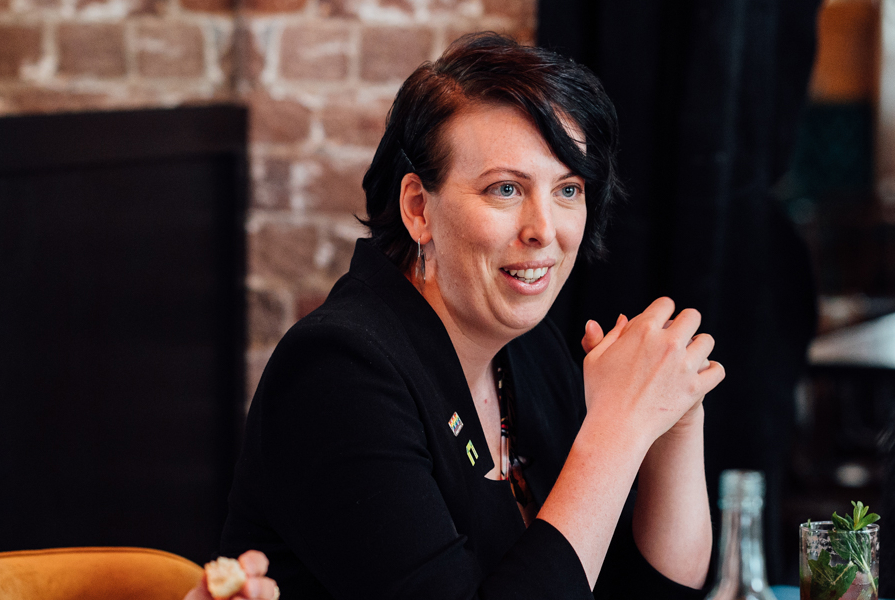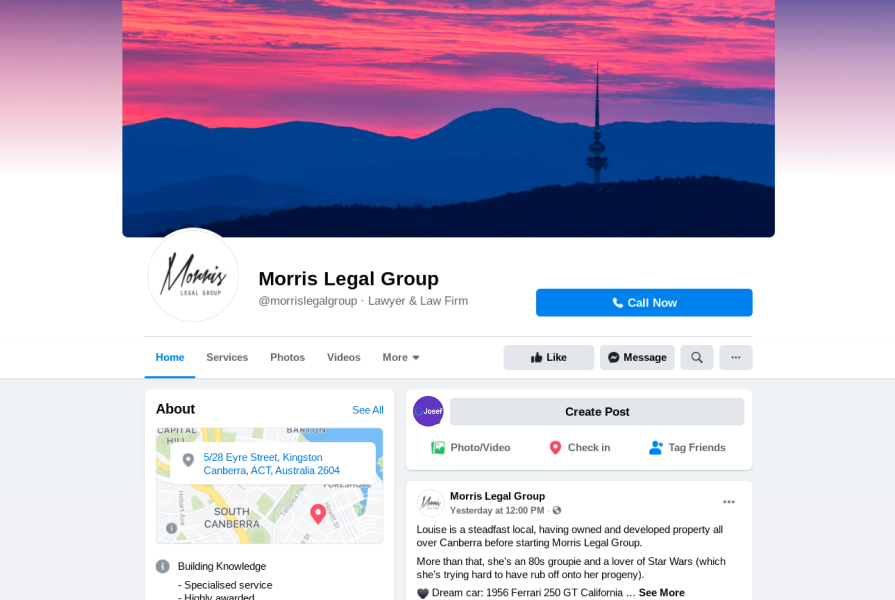“It started out as an obsession with efficiency. But really, it’s about improving the client experience.”– Louise Morris, Principal at Morris Legal Group
Louise Morris, efficiency expert and director at Morris Legal Group
In our spotlights, we feature some of our favourite Josef bot-builders and legal innovation experts to hear their stories and advice.
This time, we sat down with Louise Morris, conveyancing enthusiast and efficiency expert from Morris Legal Group, a top property and construction law firm based in Canberra. Louise has successfully used two very different Josef bots to boost client satisfaction, save time, and grow referrals.
Tell us a bit about yourself and your career to date.
I was very fortunate to have been trained in a law firm where legal document automation for property transactions was valued, and the firm invested in it heavily. I then spent seven years in property development, working for my family business.
Buying property off-the-plan is notoriously slow and can be riddled with disappointments, so that’s where I realised the benefit of systems and standardisation. It started out as an obsession with efficiency. But when I think about it, it’s about looking for patterns, understanding problems, and being able to replicate a high-quality outcome. It’s about improving the client experience.

Louise is an award-winning property and construction lawyer based in Canberra, Australia.
Tell us about your Josef bots.
We built two bots. Our quoting bot sits on the firms’ conveyancing web page, giving prospective clients personalised price estimates. The recruitment bot acts as a blind reviewer of job applications.
What inspired you to build a quoting bot?
We wanted to give people a quote not just for our professional fees but also for disbursements, without them having to call us. Our firm aims to do all fixed fee work, but the problem is that it’s actually very hard to give an accurate estimate for disbursements on a matter.
In Canberra, our market spans both the ACT and NSW areas, where the system for conveyancing and requirements for searches (which incur disbursements) is different across those two jurisdictions. Add to that, the searches differ depending on the type of property also. This means that the disbursements costs (and therefore the total price) can vary hugely from property to property.
How does the quoting bot solve this problem?
We built a bot using conditional logic to qualify the enquiry according to jurisdiction, then type of property, then the type of services they require from Morris Legal Group, to produce an accurate estimate of all fees and disbursements.
The bot takes the client on a property adventure. Through the journey, the bot informs us whether they’re buying or selling, and what kind of property it is. The bot links clients to useful resources on our website about the process for buying or selling that kind of property in that jurisdiction. It then puts all the information together to issue the prospective client with a personalised quote, which sets out each stage of their property journey, the quote for our professional fees and the estimated disbursements.
That’s far better than saying disbursements will cost “a bit extra”, and having clients finding out later that it’s actually several hundred dollars.
How have your clients responded?
It’s been up and running for six months. It’s been very successful and our clients are really impressed.
An unexpected benefit is that the bot has strengthened our referral relationships. For example, we might have a relationship with an agent who’s at a weekend auction or has a keen buyer who wants to lock in a deal after hours. That agent can tell the buyer that if they don’t have a conveyancer, they can get a quote on our website and proceed with confidence if our quote is acceptable. There’s no need to talk to anyone while they’re househunting, and we give the client a call on Monday. Our clients like that they can get this information instantly.
And what about the recruitment bot?
Our recruitment bot assesses job applications. Previously, we’d look through thousands of applications manually. But last year, we used a Josef bot to blind review candidates for two conveyancing assistant roles. With the bot, we were able to say, “For one role, experience is a threshold requirement. But for the other role, it’s not necessary to have experience”. We saved a lot of time, and all of the hires have been amazing.
I have to say that they’re more diverse than when we’d been doing it manually. We have people of different cultural backgrounds, more working parents and diversity of thought as well. Instead of just seeing that someone had worked at a good firm, we’re able to see how people think about and approach law firm life. We access a lot more information about how a candidate will contribute to culture, more efficiently.
We’ve noticed that you’re quite proficient at using digital marketing to get your bots to your audience. What’s the story behind this?
COVID-19 changed a lot about how we network and market. Our firm had already been moving into the retail space, establishing ourselves as more than boutique specialists, so digital marketing helped us reposition to make sure we were reaching the right people.

Using digital marketing and online advertising effectively helped Morris Legal Group reach the right people and reposition its services during COVID-19.
For example, the quoting bot is integrated on our website. We can look at its data analytics, link to it when speaking with referrers, and shape what clients see by setting up a dedicated conveyancing landing page.
With online advertising, we got right into analytics and my love of data and systems came alive. I’ve been able to go back at the end of our various campaigns and see which parts of our marketing plan have been working, to improve and replicate successes.
I wouldn’t say that it was any one thing in digital marketing that did the trick. I look at 2020 as a study in micro-efficiencies, very much like the British cycling team. We looked at every part of our process, and asked: How can we make this more efficient? What can we do to make the client experience better? How can we make it easier for us to deliver that experience?
What advice would you give to other bot-builders?
You need to understand how much human interaction clients want. Be realistic about where your clients’ fatigue point is with technology, and cater to it because the goal is to make the bot reach its final message.
Bots can do amazing things. For example, the quoting bot could’ve been a completely hands-off onboarding tool, taking clients from the briefing stage all the way through to getting instructions and uploading a contract. But during testing, we found clients wanted to check that there were humans on the other side of the process. Clients come to legal practitioners for advice and comfort, not just for documents. We downscaled the bot following that feedback, and it’s now a very effective tool which users love.
The other thing is to be aware of lawyers’ fatigue, in terms of maintaining and updating bots, documents, and systems. Tech isn’t a one-time fix. Sometimes you’re going to have to rebuild that bot or document. So, keep things simple! Automate the smaller tasks and documents. Harvest information you can use to engage the client. Free yourself to do the more complex work.
“Tech isn’t a one-time fix, so keep things simple! Automate the smaller tasks and documents. Free yourself to do the more complex work.”– Louise Morris, Principal at Morris Legal Group
How has your experience with Josef been?
It’s been fantastic. I like that you can organise the back end. You can see your workflow visually or in a list of steps, and toggle between the two. And it’s great that our quoting bot is fully integrated with our practice management system, Actionstep.
Josef is very intuitive. When we signed up for the training sessions, I wasn’t even thinking about using a bot for recruitment, I was focused on its legal applications. But it’s so easy to use. You can adjust Josef to your needs.
And the last thing I’ll mention that I really like is that there’s ongoing development in the product. For example, the flowchart interface has recently changed and it’s fantastic. I love that spirit of constant improvement because we’re all about that, too.
You mentioned the British cycling team earlier. When did you realise you had this passion for making things more efficient?
I think my formative moment was reading Lauren Vanderkam’s book, 168 Hours. You might say that you’ve had a very busy week, and that it wasn’t a normal one because your kid was sick or you had an appointment. But this book taught me to appreciate that on average, my life is exactly as it is and always has been. Every week cannot be an exception, and your time is limited to those 168 Hours.
So, when I returned to legal practice, I layered this thinking with the understanding law firms have about the billable hour. Are you selling time or expertise? That set me on a path of understanding the value of knowledge work and the dangers of multitasking. I realised that I’m not selling time, which is why we don’t time bill or time record.
And I’m still reminding myself every day, and continuing to learn the difficult lesson, that despite running a busy practice, my time is mine to decide how I spend it.
This builder spotlight interview has been edited for length and clarity